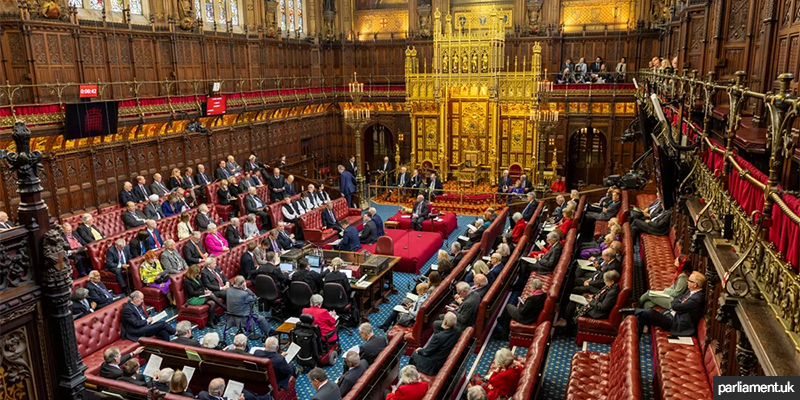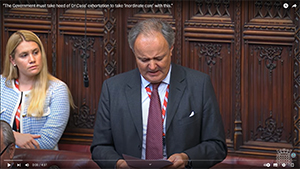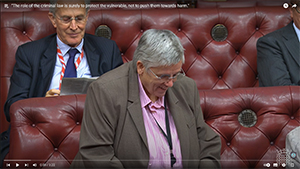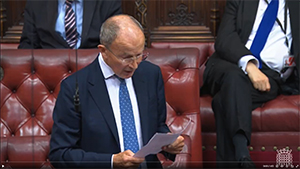
Peers warn about the unintended consequences of a conversion therapy law
It was announced in the King’s Speech that the new Labour Government will bring forward a draft Bill to ban so-called conversion practices.
During the debates on the King’s Speech, Peers expressed opposition to a new law, pointing out the unintended consequences that could arise from such legislation.
The Earl of Leicester said he was deeply concerned about the proposal to ban conversion therapy. He made clear that “no one should be subject to abuse or coercion”, but said new legislation is only justified if independent lawyers conclude that there is a gap in the law against abuse and coercion.
He stated: “My main fear is that a criminal law against conversion therapy would have unintended consequences for children and young people expressing distress over what gets called gender identity but which in reality is gender dysphoria.”
The Earl pointed to the Cass Review and said it “made it very clear that children should be able to access help to explore in a genuinely open way their experiences of gender dysphoria, and that this is not conversion practice”.
He warned: “But banning conversion practices risks scaring into silence precisely those professionals who have young people’s best interests at heart.”
Baroness Meyer echoed the Earl of Leicester’s fears about the unintended consequences of a law.
She told the House: “My greatest fear, as the noble Earl, Lord Leicester, mentioned earlier, is the unintended consequences such a ban could inflict on children who are struggling with gender identity. Medical interventions have permanent and devastating effects. Many teenagers who have undergone treatment for gender dysphoria now regret being transitioned.”
Baroness Meyer told the tragic story of Keira Bell, who was put on puberty blockers and cross-sex hormones as a teenager.
She explained: “At the age of 20, she underwent a double mastectomy. These treatments gave her masculine features, such as facial and body hair and a deep voice but, as she transitioned, she realised that it was not what she needed.”
She continued: “At 22, she decided to detransition, but to this day she is still suffering from irreversible consequences.” Baroness Meyer exclaimed: “My heart bleeds for her.”
Baroness Stedman-Scott also acknowledged the complexities of a conversion therapy law and noted that “this very thorny issue has been under discussion for six years”.
She said: “This is not just a problem with the quality of the various proposals put forward; it is also a problem with the inevitable effect of this type of legislation. The Equality and Human Rights Commission quite rightly warned of unintended consequences. It would not be the first time that good intentions delivered harmful consequences for our young people, and it is those young people who we must protect.”
Also mentioning Keira Bell and others like her, she said: “The great risk of the conversion therapy law is that we prevent people like Keira from being able to have the kinds of conversations troubled young people need to have, whether with parents or professionals.”
Lord Farmer warned the House that a conversion therapy law could inadvertently target ordinary families and Christians.
He said: “Ministers should be aware of the danger that this can be inherently anti-family and persecutory, particularly of Christians.”
He added: “Activists pushing for this want to haul loving parents before the courts and social services for expressing reservations at their child’s demand for puberty blockers. They want to criminalise church leaders for discussing or praying about Christian sexual ethics with a member of their church family.”
Baroness Fox said a conversion therapy ban was “unnecessary” because existing law already protects gay and trans people from the abusive practices often cited by activists.
She cautioned: “The dread is that, instead, we risk criminalising medical staff, teachers, therapists, religious support workers, even parents—and even free speech—for helping gender-confused young people and not simply affirming the disquieting and wrong-headed notion that they are born in the wrong body.”
The fact that the Government has promised to bring forward a ‘draft’ Bill is important, as this will give more time and opportunities for these key concerns to be raised.
What we have found is that the more people analyse the proposals, the more problems they see. Just minor scrutiny reveals the complexities of legislating to criminalise ordinary activities such as family discussions and prayer.
Scot Govt admits risk of ‘conversion therapy’ law to family life
2025-04-25 06:40:39FOI responses debunk claims of ‘conversion therapy’ problem in Northern Ireland
2025-04-24 11:27:26The latest ‘Orwellian’ conversion therapy law
2025-04-17 09:19:17





